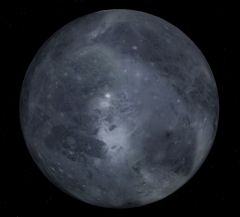Difference between revisions of "Himalia"
Jump to navigation
Jump to search
(Added content.) |
(Added table line item.) |
||
| (One intermediate revision by the same user not shown) | |||
| Line 48: | Line 48: | ||
|width="30%"|Note||align="right" width="30%"|*Elements given are from Himalia.cfg (outer_planets-060929-base.zip) | |width="30%"|Note||align="right" width="30%"|*Elements given are from Himalia.cfg (outer_planets-060929-base.zip) | ||
|} | |} | ||
| − | '''Himalia (Jupiter VI)''' is the is the largest irregular [[Natural satellites| | + | '''Himalia (Jupiter VI)''' is the is the largest irregular [[Natural satellites|satellite]] and the sixth largest satellite of [[Jupiter]]. It was discovered by [[w:Charles Dillon Perrine|Charles Dillon Perrine]] at the [[w:Lick Observatory|Lick Observatory]] on 3 December 1904. Himalia was named after a nymph in Greek mythology who bore three sons by [[w:Zeus|Zeus]]. |
== Himalia in Orbiter == | == Himalia in Orbiter == | ||
| Line 56: | Line 56: | ||
|- | |- | ||
!Add-on!!Source!!Version!!Author!!Type!!Release Date!!Compatibility!!Wiki article | !Add-on!!Source!!Version!!Author!!Type!!Release Date!!Compatibility!!Wiki article | ||
| + | |- | ||
| + | |[https://www.orbiter-forum.com/resources/celestial-bodies-motion-part-2-4-v2-0-0.295/ Celestial Bodies Motion - Part 2/4 - v2.0.0]||O-F Resources||v2.0.0||cristiapi||Scenery||2 July 2015||*module only|| | ||
|- | |- | ||
|[https://library.avsim.net/esearch.php?DLID=&Name=&FileName=outer_planets-060929-base.zip&Author=&CatID=root The Outer Planets 060929 Base]||AVSIM||||Rolf Keibel<br>Carl Romanik<br>Tony Dunn||Scenery||30 September 2006||Orbiter 2006-P1|| | |[https://library.avsim.net/esearch.php?DLID=&Name=&FileName=outer_planets-060929-base.zip&Author=&CatID=root The Outer Planets 060929 Base]||AVSIM||||Rolf Keibel<br>Carl Romanik<br>Tony Dunn||Scenery||30 September 2006||Orbiter 2006-P1|| | ||
Latest revision as of 13:16, 10 November 2024
 | This natural satellite related article is a stub. You can help Orbiterwiki by expanding it.
Himalia (Jupiter VI) is the is the largest irregular satellite and the sixth largest satellite of Jupiter. It was discovered by Charles Dillon Perrine at the Lick Observatory on 3 December 1904. Himalia was named after a nymph in Greek mythology who bore three sons by Zeus. Himalia in Orbiter[edit]Himalia was introduced to Orbiter with the release of jupiter-iii.zip in October 2002.
See also[edit]Gallery[edit]
| ||||||||||||||||||||||||||||||||||||||||||||||||||||||||||||||||||||||||||||||||||||||||||||||||||||||||





